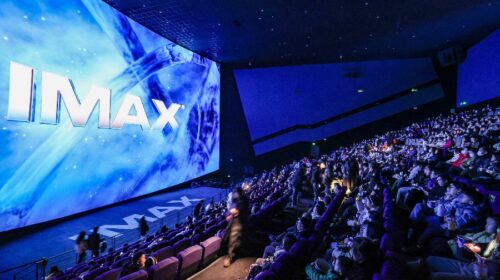Second-quarter box office blues dampen diversifying Maoyan

China’s leading movie ticket seller’s profit tumbled in the first half of 2025, as the nation’s box office sputtered after a strong start to the year
Key Takeaways:
- Maoyan warned its profit fell up to 43.8% in the first half of 2025 as China’s box office weakened in the second quarter after the huge success of “Ne Zha 2”
- The leading movie ticket seller’s stock jumped on Monday on signals that China may ease some of its tough restrictions on media content
By Edith Terry
Online ticketing giant Maoyan Entertainment (1896.HK) has been cautious lately, warning earlier this month of more sinking profits in the first half of the year that extended a steep decline for 2024. The latest warning shows that all is not well at China’s box office, even after the year got off to a roaring start with the smashing success of the animated film “Ne Zha 2.”
But relief could be on the way, as some interpreted new signals from Beijing this week as showing authorities could relax some of the country’s strict rules on content production, which are often blamed for stifling innovation. Such hopes lit a brief fire under Maoyan’s stock, as well as other content creators, on Monday. More on that shortly.
The year got off to a strong start for China’s box office on the strength of “Ne Zha 2,” which raked in a massive 15.44 billion yuan ($2.15 billion) by the time it ended its domestic run at end of March. Maoyan’s status as a China’s top movie ticket seller and also a major film distributor meant it got a cut of that bounty.
But the curtain quickly fell on the show after the huge success of “Ne Zha 2.” As ticket sales faltered, Maoyan warned that its profit tumbled 30% to 44% year-on-year in the first half of 2025 to between 160 million yuan and 200 million yuan, while its revenue rose 10% to 15% to between 2.4 billion yuan and 2.5 billion yuan. The company pointed out that after raking in 22.5 billion yuan in the first quarter of this year, China’s box office only generated a third of that – or 6.7 billion yuan – in the second quarter.
Investors may have expected the latest bad news, since the “Ne Zha” success was really just a brief intermission from an otherwise weak Chinese box office over the last two years. Reflecting that, Maoyan’s revenue fell 14.2% last year to about 4 billion yuan, while its profit tumbled 80% to 182 million yuan.
Perhaps expecting such bad news, Maoyan’s stock was mostly unchanged after the Aug. 8 profit warning. But then on Aug. 18 the company and many of its listed media sector peers rallied on signals that China may take steps to boost the industry. Shares of Maoyan and rival Damai Entertainment (1060.HK) both rose about 6% that day, while online literature provider China Literature Group (0772.HK) rose 15%.
The rally came after China’s National Radio and Television Administration held a meeting to communicate new guidelines lifting limits on episode counts and airtime for drama series, as well as quotas for overseas dramas, according to Bloomberg. Huaxi Securities said the apparent relaxation was similar to one for the gaming industry in 2023, which sharply boosted profits for that sector last year. It added the move may be an extension of a State Council announcement in January promoting “high-quality development of culture.”
Fizzling rebound
Maoyan enjoyed a brief rebound in 2023 after the end of the pandemic, with its revenue more than doubling to 4.76 billion yuan that year as its profit rose nearly ninefold to 910 million yuan. But like many other consumer-facing businesses, the company’s post-pandemic rebound quickly lost momentum as many Chinese people reined in their spending as the country’s economy slowed.
In a bid to diversify its revenue, Maoyan has been experimenting with several other areas, including content production. The company was a backer of four movies in theaters during the current summer season, including “The Lychee Road” and “Legend of Hei 2.” But some of its releases earlier in the year have been lackluster, including “The Flame on the Plain” and “Journey Through the Moon,” which grossed just 19 million yuan and 46 million yuan, respectively, according to investment bank Jefferies.
Maoyan’s focus on content production could position it nicely if China eases its restrictions going forward. But such production comes with the risk of weak sales for films and programs that get poor reviews. That was a factor depressing Maoyan’s profits in the first half of this year, according to its latest profit warning.
Another area where Maoyan is diversifying is live performance ticketing. The company is aiming to tap into a live performance ticketing market that has grown 150% since 2019, reaching about 58 billion yuan last year. During the first half of this year, Maoyan provided ticketing services for major artists such as Jacky Cheung, Jay Chou and Eason Chan, with more coming up in the second half of the year. “Such business segments are expected to have a positive impact on the company’s future operation,” Maoyan said.
In 2024, some of the same performers used ticketing and on-site services from Maoyan together with international stars Mariah Carey and Kanye West. Maoyan also expanded its self-operated ticketing platform for live performances, UUTIX, in Hong Kong and Macau, selling tickets for acclaimed director Zhang Yimou’s “Macau 2049” live performance show, and the ComplexCon sports and fashion merchandising event.
Despite the weakness at China’s box office, analysts remain bullish on Maoyan’s story, which could build momentum if the sector experiences a regulatory easing. Of the 15 analysts surveyed by Yahoo Finance, 14 rate it a “buy” or “strong buy,” with only one giving it a “hold.” Their bullishness may also reflect the company’s relatively undervalued stock, which trades at a forward price-to-earnings (P/E) ratio of just 13. By comparison, Live Nation Entertainment (LYV.US), parent of ticketing giant Ticketmaster, trades at a P/E ratio of more than 100.
Investment bank Jefferies maintained its “buy” rating on Maoyan, even after lowering its full-year revenue and non-IFRS profit forecasts by 8% and 15%, respectively, earlier this month and reducing its target price from HK$9.20 to HK$8.60. Citi also maintained its “buy” rating for Maoyan in July, citing early positive reports on films including “The Lychee Road,” “The Stage” and “Little Monsters of Langlang Mountain.”
In June, CLSA CITIC, which views live events as Maoyan’s second growth driver, gave the stock an “outperform” rating with a target price of HK$8.78 per share. It projected the company’s net profit would more than double this year to 618 million yuan, and rise another 15% in 2026 to 711 million yuan.
To subscribe to Bamboo Works free weekly newsletter, click here






